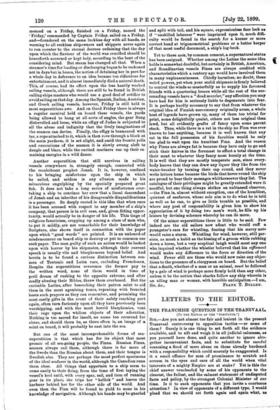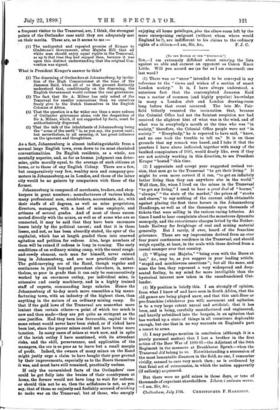LETTERS TO THE EDITOR.
THE FRANCHISE QUESTION IN THE TRANSVAAL.
[TO THE EDITOR OF THE "SPECTATOR."]
SIR,—Are you not almost too fair and lenient in the present Transvaal controversy to opposition tactics — or some of them ? Surely it is one thing to set forth all the evidence available, and to sift and weigh it in all judicial calmness, as you yourself have done, and quite another to ignore alto- gether inconvenient facts, and to substitute for careful reasoning a flood of mere abuse on those already burdened with a responsibility which could scarcely be exaggerated. Is it a small offence for men of prominence to scratch and scream in the eyes and ears of all the world when vital interests of a mighty Empire are at stake ? Yet is this the chief answer vouchsafed by some of his opponents to the clearest, the fullest, and the calmest statement of undisputed facts and policy, by the strongest Colonial Minister of our time. Is it to such opponents that you invite a courteous attention ? In view of opponents of a different type, I would plead that we should set forth again and again what, as
a frequent visitor to the Transvaal, are, I think, the strongest points of the Outlander case until they are adequately met on their merits. These are, as it seems to me:— • (1) The undisputed and repeated promise of Kruger to Gladstone's Government, after Dfajuba Hill, that all white men should enjoy equal rights in the Transvaal, as up to that time they had enjoyed them, because it was upon this distinct understanding that the original Con- vention was signed.
What is President Kruger's answer to this P
(2) The disarming of Outlanders at Johannesburg, by invita- tion of the High Commissioner at the time of the Jameson Raid, when all of us then present distinctly understood that, conditionally on the disarming, the English Government would redress the real grievances. The fact that Sir A. Milner has only asked of the Transvaal for smaller concessions than we ourselves freely give to the Dutch themselves in the English Colonies of Africa.
(4) That the question is a far wider one than a mere redress of Outlander grievances alone, vide the despatches of Sir A. Milner, which, if not supported by facts, must be authoritatively disproved.
(5) That the talk of the inhabitants of Johannesburg being the "scum of the earth" is, as you say, the purest cant ; but nevertheless, to all seeming, it has great influence on the ignorant and thoughtless.
As a fact, Johannesburg is almost indistinguishable from a normal large English town, even down to its most cherished conventionalities. Its English residents, as a whole, are mentally superior, and, as far as human judgment can deter- mine, quite morally equal, to the average of such citizens at home, or to those of any English Colony. There are a few, but comparatively very few, wealthy men and company-pro- moters in Johannesburg, as in London, and those of the latter city would be no gainers by comparison with those of the former.
Johannesburg is composed of merchants, traders, and shop- keepers in great numbers ; manufacturers of various kinds, many professional men, stockbrokers, accountants, 8z.c., with their staffs of all degrees, as well as mine proprietors, directors, managers, with a host of mine employ6s, and artisans of several grades. And of most of those uncon- nected directly with the mines, as well as of some who are so connected, it may be said that they have been enormous losers lately by the political unrest; and that it is these losses, and not, as has been absurdly stated, the spur of the capitalist, which has at length goaded them into renewed agitation and petition for redress. Also, large numbers of them will be rained if redress is long in coming. The early conditions of an ordinary mining camp, with the usual rough- and-rowdy element, each man for himself, never existed long in Johannesburg, and are now practically extinct. The gold-carrying ore of the Rand, though regular and continuous in yield beyond precedent elsewhere, is, never- theless, so poor in grade that it can only be remuneratively worked by an enormous outlay, per individual mine, in extensive End costly machinery, and in a highly trained staff of experts, commanding large salaries. Hence the Johannesburg of to-day much more resembles a big manu- facturing town, with an industry of the highest class, than anything in the nature of an ordinary mining camp. So that if the gold laws of the Transvaal are somewhat more lenient than certain others—a point of which too much is now and then made—they are yet quite as stringent as the case justifies. Had they been less favourable, capital to the same extent would never have been risked, or if risked have been lost, since the poorer mines could not have borne more taxation. In many cases of mines at work now, and in spite of the lavish outlay I have mentioned, with its attendant risks, and the skill, perseverance, and application of the managers, the ore is so poor as to leave but a small margin of profit. Indeed, the owners of many mines on the Rand might justly urge a claim to have bought their poor ground by their improvements, especially as to the Boers themselves it was, and must have still remained, practically useless.
If only the unvarnished facts of the Outlanders' case could be got fully into the brains of their countrymen at home, the former would not have long to wait for redress; or should this not be so, then the selfishness is not, as you say, that of those so unjustly and foolishly accused of wishing to make war on the Transvaal, but of those, who smugly
(3)
enjoying all home privileges, plus the elbow-room left by the more enterprising emigrant (without whom where would England be ?), are indifferent to his claims to the ordinary
rights of a citizen.—I am, Sir, &c., F. J. C.



































 Previous page
Previous page